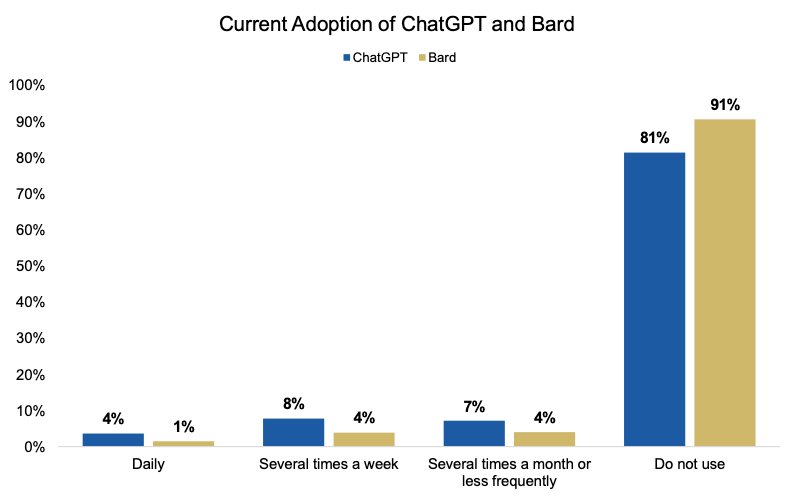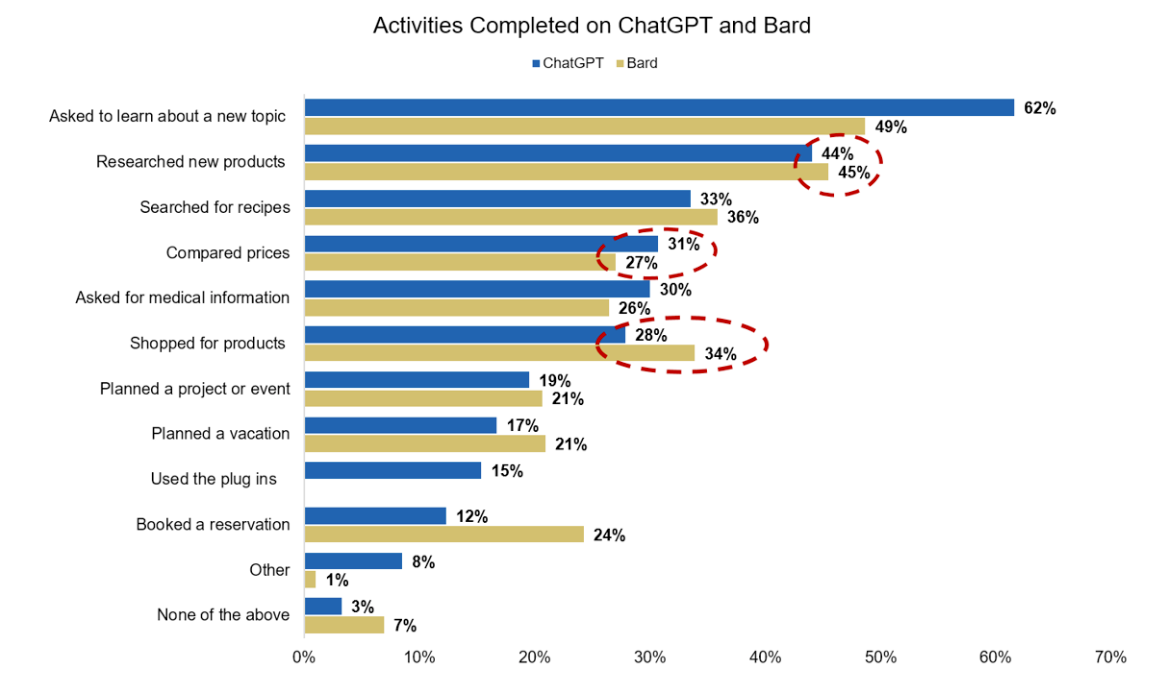Amazon Review Summaries, AI (Not?) a Threat to Google, Top o' the Funnel

Fake Review Summaries
Amazon may be in denial about how counterfeiting and review fraud are long-term threats to its brand. According to a recent US-UK consumer survey, 84% of shoppers are concerned about fake reviews on Amazon – more than any other major retail site. As with Google, Amazon has seemingly stepped up fake review enforcement recently. And in a related move Amazon is testing AI-generated review summaries. As the image below reflects, elements of multiple reviews are integrated into a single summary. Google is doing something similar in SGE product search: combining attributes from different sources. Despite review fraud wariness, consumers still rely heavily on them. Yet nobody wants to read through dozens of reviews or second guess which ones are real. In that sense Amazon's review summaries could be helpful to shoppers. They also could be designed in part to obscure fake reviews – by getting consumers to focus on aggregate ratings and a single overall review narrative.

Our take:
- Google and Amazon face no direct consequences in North America for the proliferation of fake reviews today.
- But in Europe, the Digital Services Act requires action. That may be partly responsible for increased fake review enforcement of late.
- It's not that these companies condone fake reviews but they aren't a business priority, absent controversy or some form of public shaming.
Google Will Be Swept Away – or Not
The early hot take on AI-chat vs. Google was that AI would likely "kill Google and Amazon" as they currently exist. Bill Gates said that at an investor conference in May, speaking about the emergence of personal AI assistants. That idea was echoed in a podcast interview with Mustafa Suleyman, one of the co-founders of Google's DeepMind, now a co-founder of Inflection.ai. Accordingly, some people think the traditional SERP could be "gone" in a couple of years. The counter argument is that Bing's traffic, after a bump, is flat and relatively few people are using ChatGPT or Bard. In addition, one of the co-founders of Neeva argued that "convincing users to pay for a better experience was actually a less difficult problem compared to getting them to try a new search engine in the first place." In other words, search habits are so ingrained no disruption is imminent. We almost certainly have another case of Amara's Law: "We tend to overestimate the effect of a technology in the short run and underestimate the effect in the long run."

Our take:
- If you spend enough time with various "conversational AI" tools you come away convinced (or I do) that current SERPs won't entirely survive.
- Medium term, we'll probably see migration of some use cases and queries to other platforms/tools.
- Google is ambivalent about bringing AI into the SERP (not ambivalent about ads), which is making for a weaker product.
AI Search: Top o' the Funnel
The Morgan Stanley report cited above contains data on search and social user behaviors. Based on a survey of 2,000 US users (16+), it explores whether and how people are using AI tools like ChatGPT and Bard. I speculated that AI may siphon off some percentage of Google research queries in the medium term. As indicated in the graphic above, regular usage is relatively low. If they numbers can be extrapolated there are about 20 million US users of ChatGPT "several times a week." But what are those people doing? Morgan Stanley's survey showed that people are using ChatGPT and Bard in ways they would have used Google. Much of it is research-oriented or informational: 1) learn about new topics, 2) research products, 3) recipe search, 4) price comparisons. According to separate research about 80% of Google queries are "informational."

Our take:
- All this is speculation right now and any survey must be read with caution, but there are some danger signs for Google.
- If 80% of searches are informational then Google is vulnerable to search erosion, with implications for the rest of the funnel.
- It's worth noting how much product search activity is on the list: researching products, shopping for products and price comparisons.
Recent Analysis
- Near Memo: When to ask for reviews, Is SGE a headfake? Is Apple Vision the next platform?
- Missing Google Reviews: A Step-by-Step Recovery Guide, by Mike Blumenthal
Short Takes
- Yellow pages ad/page counts history of decline.
- Moz: 6 local SEO tips for summer success.
- Is Google SGE a "plagiarism engine"?
- Google Marketing Live implications for local-SMBs.
- TikTok tests visual product search feature.
- Meta is now the Android of AR/VR after Vision Pro reveal.
- Apple Business Connect shows customer heatmaps.
- The privacy violating world of data brokers.
- US "spying" on Americans, buying personal data on open market.
- Privacy: Strava "anonymous" heatmaps can reveal residences.
- PayPal wants larger piece of SMB payment processing market.
- Europe wants to break up Google's ad business too.
- Google delays Bard Europe over privacy issues.
- How private equity is ruining every industry it touches.
Listen to our latest podcast.

How can we make this better? Email us with suggestions and recommendations.

